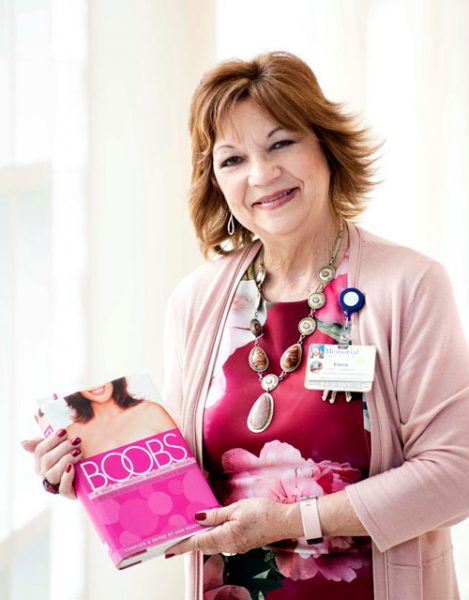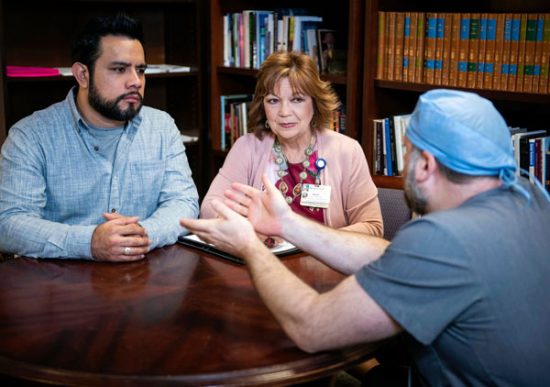Trailblazer – A Beacon of Light for Non-English Speaking Patients

“Imagine being sick in an unfamiliar environment and unable to speak or understand English,” says alumna Elena Santamaria. “Suddenly, someone walks into your room offering a friendly greeting in Spanish and asking, ‘How may I help you today?’ Immediately, they smile and you can see they feel safe and less anxious.”
Santamaria confronted that situation many times throughout her career as a medical interpreter. She counts herself lucky for finding a profession that fueled her passion to serve others. In 2005, Santamaria had just moved to Savannah from Atlanta when she found a job as an administrative assistant at Memorial Health University Medical Center.
“Word got out that I was a Spanish medical interpreter and staff started calling me to help them communicate with their patients and families,” she said.
Filling a Void
Seeing the need for an interpretation services department at Memorial Health, Santamaria led efforts to establish one. She said having a qualified medical interpreter reduces errors, improves safety, increases patient satisfaction and it is their right. Historically, she noted about 87 percent of the foreign language interpretation requests are for Spanish.
“For the past 13-and-a-half years, it has been very rewarding to see how the department has grown and gained respect by an incredible staff of physicians, nurses and team members,” she said. “We interpret everywhere in the hospital where there is a patient that does not speak English. From interpreting in the labor and delivery room witnessing a miracle in life, the birth of a baby, to the Intensive Care Unit for a critically ill patient facing an end of life situation.”
Santamaria added that the interpreters are compassionate and empathetic in their approach.
“A great responsibility falls on our shoulders because the words that we say are not our own, they are the provider’s words and the patients/families,” she noted. “We tell the health care provider and the patient to look and speak to each other, not the interpreter, while allowing the interpreter to transmit their words. We are just their voice, we are transparent.”
A year after establishing the interpretation services department, Santamaria implemented the Bilingual Volunteer Interpretation Services program. The volunteers support the “medical Spanish interpreters by interpreting non-medical and administrative encounters, allowing more time for the hospital interpreters to focus on medical interpretations,” Santamaria explained.

Defining Moments
Originally from Cuba, Santamaria was five years old when her parents moved to Miami. She gained her American citizenship, got married and raised a son and daughter. Her husband’s career took them to different cities but she never forgot her goal to get a college degree. In her 40s, something happened that changed her life.
“Twice, I heard the words no one wants to hear, ‘You have breast cancer.’ It has been 19 years since I first heard the words and then again in 2016,” Santamaria said. “I am a two- time breast cancer survivor. The first time, I thought my life was over, but I have come to realize that having breast cancer was one of the most empowering events of my life. Through adversity, I found strength.”
After undergoing surgery and chemotherapy, Santamaria knew it was time to pursue “the dream of her youth.” Divorced after 30 years, working full time and taking care of her 85-year-old mother, she enrolled at Armstrong despite the many obstacles. “I thought, ‘Will I feel lost; will I always be the oldest person in the class? What will they think of me? Will I be able to make good grades?’ I remember having to take a tennis class. I won some of the matches and gained the respect and esteem of the students,” she said.
Childhood Dream Fulfilled
At age 58, the non-traditional student earned her bachelor’s in Spanish language and literature. Her children, mother and grandchildren were in the audience cheering her on.
“What joy! What emotion! I had fulfilled my dream after 30 years,” she said. “I know that I leave my grandchildren a good lesson. Age is not important. It is never too late when something is worth the wait.”
Even though she retired in February, Santamaria continues to support the cause that is dear to her heart.
She works with the American Cancer Society “calling Latina women all over the country who are going through the treatments and giving them hope and encouragement.
She co-authored the book, B.O.O.B.S.: A Bunch of Outrageous Breast-cancer Survivors, in which nine other women share their personal experiences from diagnosis to surgery and beyond. As a supporter of the Komen Race for the Cure, the Armstrong alumna has vowed to continue to walk until a cure for breast cancer is found.
“I hope and pray that in my lifetime, we will find a cure so that our daughters and granddaughters do not have to live in fear of hearing the words, ‘You have breast cancer,’” said the grandmother of four.
Now that she has plenty of free time, Santamaria is making plans to keep busy.
“I am praying that the Lord will guide me into the next exciting chapter in my life” she said. “I want to do volunteer work in the community, work PRN (as needed) as a Spanish medical interpreter, travel, do more Zumba, ballroom dancing and enjoy my beautiful grandchildren before they go off to college.”
– Sandra Bennett
